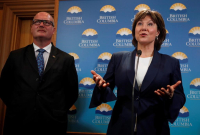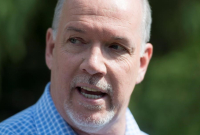Support strong Canadian climate journalism for 2025
British Columbia's opposition parties accused Premier Christy Clark of adopting their policies and campaign promises Thursday in a last-ditch bid to hold onto power as her minority government faces defeat in a legislature showdown next week.
The government's throne speech included about a dozen planks from the New Democrat and Green party platforms in last month's provincial election, which reduced the Liberals to a minority government after 16 years in office.
"I believe the B.C. Liberals have lost their way," said NDP Leader John Horgan. "I believe they no longer represent and reflect the values of this diverse and dynamic province."
Clark's throne speech highlighted key NDP campaign promises, including eliminating bridge tolls and raising monthly welfare rates by $100.
The Liberals would also hold a referendum on electoral reform after the opposition parties came out in support of proportional representation. Two previous referendums on electoral reform have failed in B.C.
Green Leader Andrew Weaver said he was heartened to see the Liberals adopt Green policies, but his party remains focused on toppling the government in a confidence vote.
"We cannot have confidence in a government that for 16 years has argued against these policies and in the last few days has suddenly recognized that they are in the best interests of British Columbians," Weaver said in a statement.
The election gave B.C. its first minority government in 65 years, with the Liberals winning 43 seats, the NDP 41 and the Greens three in the 87-seat legislature. The NDP and the Greens signed an agreement to combine their seat total and vote down the Liberals in a bid to form a minority NDP government.
Clark said the throne speech shows her government is willing to change after hearing from voters.
"Why shouldn't governments change their minds in response to what British Columbians tell us," she said. "We need to be willing to change course."
Clark rejected NDP and Green suggestions that she adopted their policies simply to stay in power.
"It's not an NDP platform because it's not raising taxes," she said. "It's not firing thousands of people across the province and it's not increasing deficits."
The government's agenda seeks a balance between economic, social and environmental issues, says the speech, read in the legislature by Lt.-Gov. Judith Guichon.
"British Columbians voted for parties that spoke to the importance of economic growth and jobs, strengthening our social programs, and protecting our environment," it says. "They have told us to find a better balance to move forward on all these priorities."
The speech includes promises to eliminate tolls on the Port Mann and Golden Ears bridges in the Vancouver area, cut the provincial sales tax to offset an annual increase of $5 a tonne in the carbon tax, spend $1 billion on early childhood education, and ban union and corporate donations to political parties.
Clark said a higher than forecast budget surplus allows the government to pursue innovative options, although the size of the surplus won't be released until next month.
Earlier Thursday, a former Liberal cabinet minister was acclaimed Speaker in what might be a short-term appointment.
Steve Thomson, a former minister of forests, lands and natural resource operations who represents Kelowna Mission, said he is not looking beyond his duties in the event of the Liberal government's defeat and it would be up to a new government to appoint a Speaker.
But he didn't say from which party the Speaker should be chosen.
"If the government changes, it's the government that identifies a Speaker," he told a news conference. "Again, I'm not going to speculate as to how things will unfold. My job will be to manage the house ... to the best of my ability."
The position is a key one in this legislature because of the close election outcome and the prospect of tied votes that the Speaker would have to break.
Horgan and Weaver described Thomson as a person of integrity, adding if he were to extend his duties should the NDP form a minority government that would be welcome.





Comments
I am a bit confused why the Liberals chose the Speaker. I thought it was a secret ballot election by all MLAs. Can you direct me to the definitive source for this question? Thanks